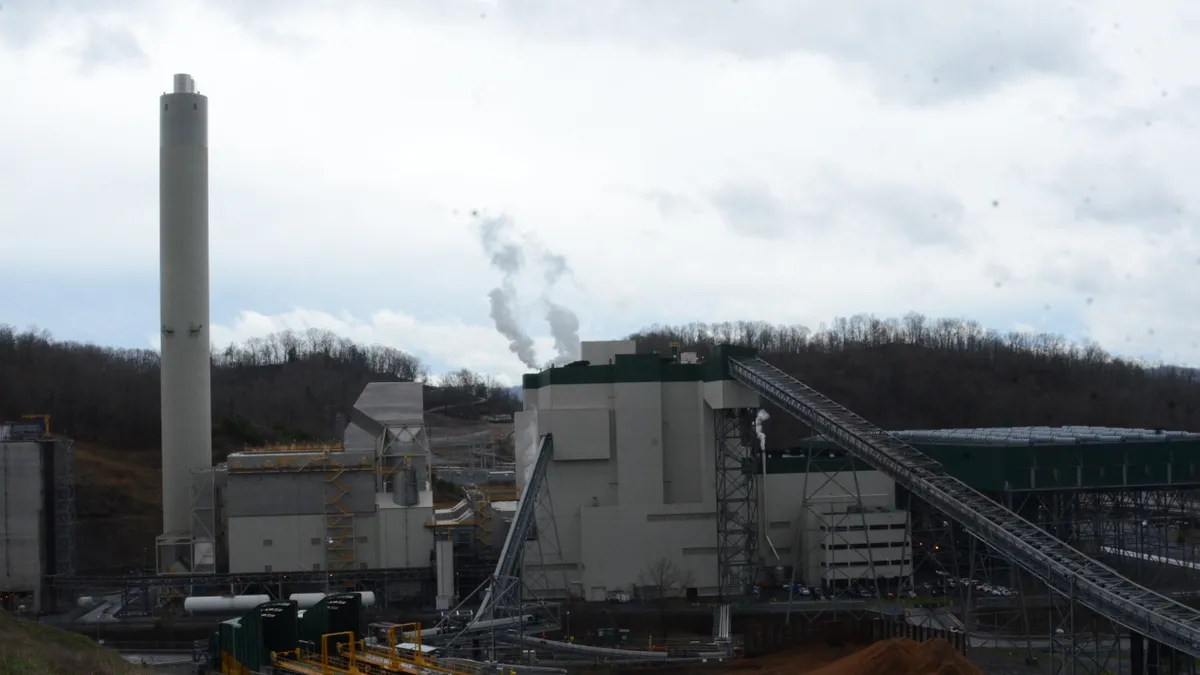Dive Brief:
- Walmart, one of Dominion Energy's largest customers in Virginia, warned regulators that their consideration of the utility's plan to offer a 100% renewable energy option to C&I and residential customers includes unreasonable pricing, according to a Monday filing.
- An April report from Virginia State Corporation Commission (SCC) hearing examiner Mary Beth Adams recommended approving Dominion's proposed tariff. The utility largely approves of Adams's recommendations and wants to see the tariff approved quickly, to prevent customers from leaving its service.
- Walmart, alongside renewable energy advocates, said the premium would be paid for an inferior product, as it would include "energy that most customers do not consider to be renewable," such as co-fired coal and biomass units. The company has long-opposed the tariff but noted a litany of oversights in the net-positive report from Adams.
Dive Insight:
Dominion is eager for regulators to approve its proposed 100% renewable energy tariff, after submitting the plan in May of 2019 as some of its largest customers tried to leave its service.
High costs and the lack of existing 100% renewable energy options in Virginia have driven large customers to seek exit from Dominion's service.
The utility urged the SCC to issue an order approving the tariff, which would prevent other companies like Direct Energy and Calpine from signing up new customers for their 100% renewable service. Virginia is a regulated state, and customers that wanted to receive all renewable energy were allowed to exit Dominion's service if they could not get that from the utility itself.
While Calpine and Direct Energy have made progress on gaining new customers in Virginia, regulators denied the exit applications of Walmart and Costco last summer, due to concerns over impacts to other ratepayers.
Walmart wrote in its Monday response Adams' report failed to take into account the rates of other competitive service providers offering 100% renewable energy, although Direct Energy offered live testimony in the proceeding on competitive pricing.
"[R]ather than needing to offer a product that charges a premium above standard service — as Dominion proposes here — customers should be able to pay less than standard service to receive 100% renewable power," Walmart wrote in its response.
Walmart and other stakeholders also commented that the tariff cannot be for a 100% renewable offering if it includes coal-burning units.
Dominion's proposal for a 100% renewable energy tariff has stirred up controversy by including the Virginia City Hybrid Energy Center (VCHEC), a coal-fired power plant that burns biomass as 7% of its output. The utility includes VCHEC in the renewable package under a Virginia statute that legally defines "renewable energy" as an electric power plant that generates a certain proportion of energy by burning biomass.
Calpine, which has continually opposed the tariff that would shut it out from gaining new customers in Virginia, highlighted the large amount of stakeholder opposition, particularly from customers. "Dominion could not identify any customer that it talked to when assembling the [100% renewable tariff] portfolio" and the utility "does not have specific examples or evidence that customers want Rider TRG," as the proposed tariff is known, Calpine wrote in a filing on Monday.
However, the Division of Consumer Counsel from the Virginia Office of the Attorney General endorsed Adams' report.
The report agrees with Dominion that VCHEC energy follows Virginia law, making it "eligible for inclusion" in the utility's renewable energy portfolio. While it didn't disapprove of Dominion's use of VCHEC, the report suggested two alternative portfolios: one without VCHEC and one that excludes all biomass-fired plants, as that form of renewable energy is not emissions-free.
"[P]otential customers might be either confused by a 100 percent renewable offering that includes a generation facility that must burn coal to produce renewable electricity or resistant to pay a premium for renewable energy that is created in conjunction with coal combustion," Adams wrote.
In its response, Dominion asked the SCC to reject the finding that a "no biomass option" is a reasonable alternative, but does not oppose the "no VCHEC" option. The Consumer Counsel also supports the "no VCHEC" option.
The report also stipulates that Dominion must sign up 100 MW of load for at least 15,000 customers in six months or be canceled. Dominion opposes the six month deadline, arguing that there is no basis for a sunset provision in the applicable law and the SCC "retains authority to modify or amend [the tariff] at any time."















